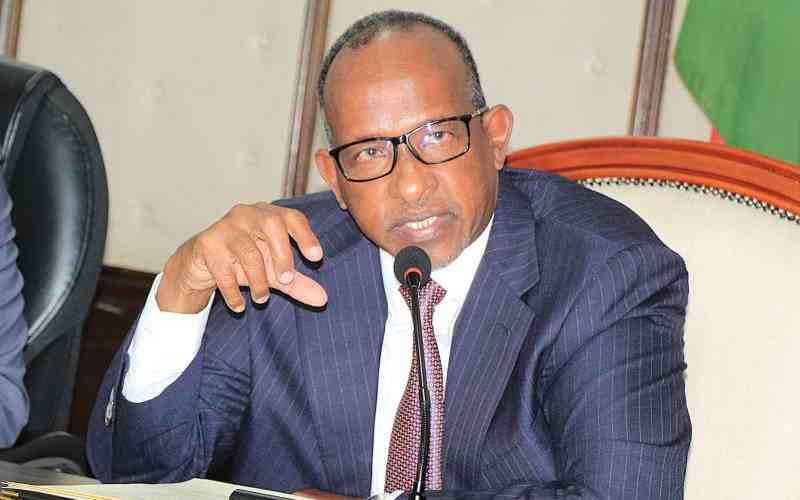
Health Cabinet Secretary Aden Duale has assured the Senate that the government is committed to the recognition, inclusion, and protection of persons living with invisible disabilities, following a petition that accused the State of neglect and exclusion.
Appearing before the Senate Labour and Social Welfare Committee, Duale said the Ministry of Health will identify legislative gaps and prepare a proposal for parliamentary adoption to ensure people with invisible disabilities receive quality healthcare and essential services. "We will ensure that there is access to quality healthcare services for all Kenyans, including those with visible and invisible disabilities," said Duale.
The CS was responding to a petition by Beatrice Likwop, who urged the Senate to investigate the government's failure to recognise people with invisible disabilities in national policy and service delivery.
In her submission, Likwop pleaded with the Senate to recommend inclusion of invisible disabilities in policy frameworks, establish representation for affected persons, and ensure access to healthcare, medicine, and financial support.
"The Senate should investigate and ensure a constant supply and availability of essential medicine and treatment in referral hospitals. People with invisible disabilities need a representative to safeguard their interests in terms of benefits, funding, job opportunities and programmes," said Likwop.
She claimed that the Ministry of Health, the Department of Social Protection, and the National Council for Persons with Disabilities (NCPWD) had failed to accommodate people living with invisible conditions - such as neurological, cardiac, or autoimmune disorders - in their strategies.
- Retired teacher finds new calling in empowering PWDs in Busia
- How new trade deal will limit Kenyans' access to affordable drugs
- Faith leaders call for investment in health services amid shrinking donor funding
Keep Reading
"The government has not sensitised society about invisible disability, leading to stigmatisation, discrimination, denial of job opportunities, social isolation, and even rejection by landlords," she added.
Likwop said patients in this category often require lifelong access to specialised medication and services from cardiologists and urologists, which are unavailable in many county referral hospitals and unaffordable in private ones.
She cited a lack of coordination between national and county governments, further compounding the accessibility crisis.
"People with invisible disabilities should be considered for universal healthcare and receive prompt and express services in hospitals, banks, supermarkets and other public spaces. But that's not the case since their conditions are not visible or acknowledged," she said.
Committee Vice Chairperson, Nominated Senator Crystal Asige, chaired the session, which called for clear and actionable commitments from the State.
Joseph Motari, the Principal Secretary for Social Protection and Senior Citizen Affairs, admitted there was no accurate or inclusive data on persons with disabilities, particularly those with invisible conditions.
He revealed that the government has secured Sh100 million from the World Bank to mop up and register all persons with disabilities, and create a comprehensive data repository.
"We have some 5.1 million Kenyan indigenous [records], but it is not inclusive. The Sh100 million will help us collect more accurate data," said Motari.
Duale also took aim at overcrowded public hospitals, saying every facility must admit patients according to its licensed capacity and that the Ministry is working to restore dignity in patient care.
"If you want to admit more patients, build more wards. The dignity of our patients is our priority. The facilities are not our bosses - the patients are," he said.
He criticised past leaders who sent their families to private hospitals while tolerating overcrowded and under-resourced public health institutions for ordinary citizens.
 The Standard Group Plc is a multi-media organization with investments in media
platforms spanning newspaper print
operations, television, radio broadcasting, digital and online services. The
Standard Group is recognized as a
leading multi-media house in Kenya with a key influence in matters of national
and international interest.
The Standard Group Plc is a multi-media organization with investments in media
platforms spanning newspaper print
operations, television, radio broadcasting, digital and online services. The
Standard Group is recognized as a
leading multi-media house in Kenya with a key influence in matters of national
and international interest.











